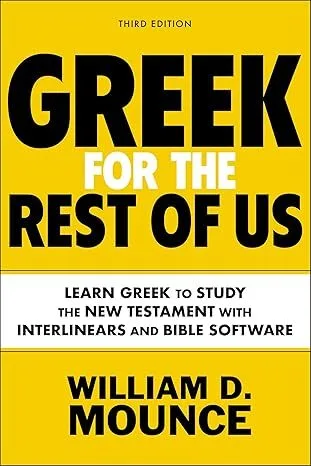Pronunciation Guide: HOP-oo
Quick Answer: ὅπου (hopou) is a Greek adverb meaning “where,” “wherever,” or “in which place,” often revealing God’s omnipresence and the spiritual significance of location in divine purposes and eternal realities.

Key Information
ὅπου

Strong’s Entry
g3699
hopou (hop’-ou) adv.1. what(-ever) where, i.e. at whichever spot[from G3739 and G4225]KJV: in what place, where(-as, -soever), whither (+ soever) Root(s): G3739, G4225
1. What Does ὅπου Mean?
Strong’s G3699: ὅπου is a relative adverb that fundamentally means “where” or “in which place.” This word serves as a spiritual compass in Scripture, pointing not merely to physical locations but to profound theological truths about God’s presence and purpose. Unlike simple geographical markers, ὅπου often introduces statements about eternal realities, divine presence, and the intersection between heaven and earth. The word carries the weight of divine intentionality, suggesting that God’s “where” is never arbitrary but always purposeful.
Key Insight: ὅπου reveals that in God’s economy, location matters—both physically and spiritually—because His presence transforms every “where” into holy ground.
2. Where Does ὅπου Come From?
- Part of speech: Relative adverb
- Root words: Derived from ὅς (hos, “who/which”) + πού (pou, “where”)
- Language origin: Classical Greek
- Primary usage: Narrative, teaching, and prophetic sections
- Function: Introduces relative clauses of place
3. What Is the History of ὅπου?
The word ὅπου has a rich classical heritage, appearing frequently in the works of Homer, Plato, and Aristotle to denote spatial relationships and conditional locations. In classical literature, philosophers like Plato used ὅπου to explore metaphysical concepts about the nature of being and place. Aristotle employed it in his discussions of physics and metaphysics, particularly when examining the relationship between form and location.
In the Septuagint, ὅπου takes on heightened theological significance, often translating Hebrew terms that indicate divine presence or sacred space. The Septuagint translators recognized that this simple adverb could carry profound theological weight when describing God’s dwelling places or the locations where He reveals Himself. Early church fathers like John Chrysostom and Augustine frequently commented on passages containing ὅπου, noting how the Messiah Jesus transforms the very meaning of “where” by making every location potentially sacred through His presence.
Historical Summary: ὅπου evolved from classical Greek spatial reference to become a theologically loaded term in biblical literature, emphasizing divine presence and purpose.
4. How Should ὅπου Be Translated?
- Where – indicating a specific location or place
- Wherever – expressing universality of location
- In which place – formal locative reference
- The place where – emphasizing the significance of location
- Whither – archaic form indicating direction or destination
Translation Tip: Context determines whether ὅπου emphasizes physical location, spiritual condition, or eternal destination—each carries different theological implications.
ὅπου Translation Options:
- Where – Most common translation, emphasizing specific location with spiritual significance
- Wherever – Used when the text emphasizes the universality or indefinite nature of the location
- In which place – Formal translation that maintains classical Greek precision
- The place where – Emphasizes the importance and permanence of the location
- Whither – Archaic but theologically rich, often used in passages about eternal destiny
5. How Is ὅπου Used in the Bible?
Throughout the New Testament, ὅπου appears 82 times, most frequently in the Gospels where the Messiah Jesus uses it to describe spiritual realities through physical metaphors. The word often introduces profound theological statements about treasure, heart, gathering, and divine presence. In Matthew’s Gospel particularly, ὅπου serves as a bridge between earthly illustrations and heavenly truths, as seen in passages about storing treasures and gathering in His name.
The Septuagint usage of ὅπου often translates Hebrew terms indicating God’s dwelling place or the location of divine encounters. This background gives New Testament usage deeper resonance, as readers would understand that “where God is” transforms ordinary space into sacred space. Paul’s epistles use ὅπου to describe the spiritual locations of believers—where they are “in the Messiah” and where the Messiah dwells within them.
Usage Summary: ὅπου primarily appears in Jesus’ teachings to reveal that physical locations carry spiritual significance, especially where God’s presence dwells.
- “Do not store up for yourselves treasures on earth, where [ὅπου] moths and vermin destroy, and where thieves break in and steal.” Matthew 6:19
- “But store up for yourselves treasures in heaven, where [ὅπου] moths and vermin do not destroy, and where thieves do not break in and steal.” Matthew 6:20
- “For where [ὅπου] your treasure is, there your heart will be also.” Matthew 6:21
- “For where [ὅπου] two or three gather in my name, there am I with them.” Matthew 18:20
- “Where [ὅπου] I am, my servant also will be.” John 12:26
- “And if I go and prepare a place for you, I will come back and take you to be with me that you also may be where [ὅπου] I am.” John 14:3
- “Father, I want those you have given me to be with me where [ὅπου] I am, and to see my glory.” John 17:24
6. What Cultural Context Surrounds ὅπου?
In ancient Jewish thought, the concept of place carried profound theological significance that goes far beyond modern Western understanding. The Hebrew concept of מָקוֹם (makom), meaning “place,” was often used as a name for God Himself, reflecting the belief that God is the ultimate ground of all being and the source of all space. This theological understanding of place deeply influenced how Greek-speaking Jews and early believers understood ὅπου in Scripture.
The ancient world also recognized the concept of “thin places”—locations where the boundary between the physical and spiritual realms seemed permeable. Jewish tradition identified certain locations as particularly sacred: the Temple in Jerusalem, Mount Sinai, Jacob’s Bethel. When the Messiah Jesus uses ὅπου, His Jewish audience would understand that He’s not merely giving geographical directions but revealing spiritual geography—the eternal significance of where God chooses to manifest His presence.
Cultural Context: Ancient Jewish theology viewed “place” as sacred when connected to divine presence, making ὅπου a word loaded with covenant significance.
7. What Does ὅπου Teach Us About God?
The frequent use of ὅπου in Scripture reveals God’s omnipresence while simultaneously showing His choice to manifest His presence in specific ways and places. This paradox—that the infinite God who fills all space chooses to be present in particular “wheres”—demonstrates both His transcendence and His intimate desire for relationship with His people. When the Messiah Jesus says, “where two or three gather in My name, there am I with them,” He’s revealing that His presence transforms any ordinary location into a sacred meeting place.
Furthermore, ὅπου reveals God’s eternal perspective on location and destination. The passages about treasure in heaven suggest that our ultimate “where” matters infinitely more than our temporary earthly locations. God’s character is revealed as one who prepares places for His people, making Him not just omnipresent but intentionally preparatory—always working ahead of us to ready the places where He calls us to be.
Theological Core: ὅπου reveals God as both omnipresent and intimately personal, transforming every location where His people gather into sacred space.
8. How Can I Apply ὅπου to My Life?
Understanding ὅπου challenges us to view every location in our lives as potentially sacred space where God desires to meet with us. Whether we’re in our homes, workplaces, or traveling, the question becomes: “How is God present here, and how can I recognize His presence?” This awareness transforms routine locations into opportunities for worship and service, making us more conscious of God’s omnipresence in our daily lives.
The treasure passages using ὅπου also call us to examine where we’re investing our time, energy, and resources. If our treasure is where our heart is, then understanding the eternal significance of our “where” helps us make decisions that align with God’s eternal purposes rather than temporary earthly gains.
Self-Examination Questions: Where am I investing my deepest treasures? How can I cultivate awareness of God’s presence in every location I inhabit? What “places” in my life need to be surrendered to God’s transforming presence?
9. What Words Are Similar to ὅπου?
- ποῦ (pou) – POO – “where?” (interrogative) – Asks questions about location, unlike ὅπου which makes statements about it – See G4226
- ὅθεν (hothen) – HOH-then – “from where” – Indicates origin or source rather than location – See G3606
- ἔνθα (entha) – EN-tha – “where, there” – Classical form less common in New Testament – See G1759
- τόπος (topos) – TOH-pos – “place, location” – Noun form focusing on the place itself rather than the relationship to it – See G5117
- χώρα (chora) – KHOH-rah – “country, region” – Emphasizes broader geographical areas rather than specific locations – See G5561
10. Did you Know?
- What does ὅπου mean in modern Greek? In contemporary Greek, ὅπου still means “where” and “wherever,” maintaining its basic locative meaning but losing much of the theological weight it carries in biblical contexts.
- How did Plato use ὅπου? Plato employed ὅπου in his philosophical dialogues to explore the relationship between the world of forms and physical reality, particularly in discussions about where true knowledge and beauty reside.
- What’s the difference between ὅπου and ποῦ? While both relate to “where,” ποῦ asks questions about location (“Where is it?”) while ὅπου makes statements or introduces clauses about location (“where it is” or “wherever it may be”).
- Why does the Bible use ὅπου most frequently in Jesus’ teaching? The Messiah Jesus used ὅπου to reveal spiritual geography—showing His listeners that physical locations carry eternal significance when connected to God’s purposes and presence.
- How does ὅπου relate to the doctrine of omnipresence? ὅπου paradoxically reveals both God’s universal presence everywhere and His specific choice to manifest His presence in particular places and circumstances.
- What causes confusion about “place” in modern Christianity? Unlike ancient believers who understood location as theologically significant, modern Christians often separate physical and spiritual realms, missing the biblical truth that God transforms ordinary places into sacred space through His presence.
11. Remember This
ὅπου reminds us that in God’s kingdom, geography is theology—every “where” matters because our omnipresent God chooses to meet us wherever we are while calling us to where He wants us to be.
Note: While this entry strives for accuracy, readers engaged in critical research should verify citations and keyword occurrences in their Bible translation of choice. For Biblical citations, the F.O.G Bible project recommends Logos Bible software.
Strong's g3699
Add Comment
God's Word is too vast for a single perspective. We all have a story, and as believers we all carry the Holy Spirit who is the Revealer. With this in mind - I would love to read your comments.




